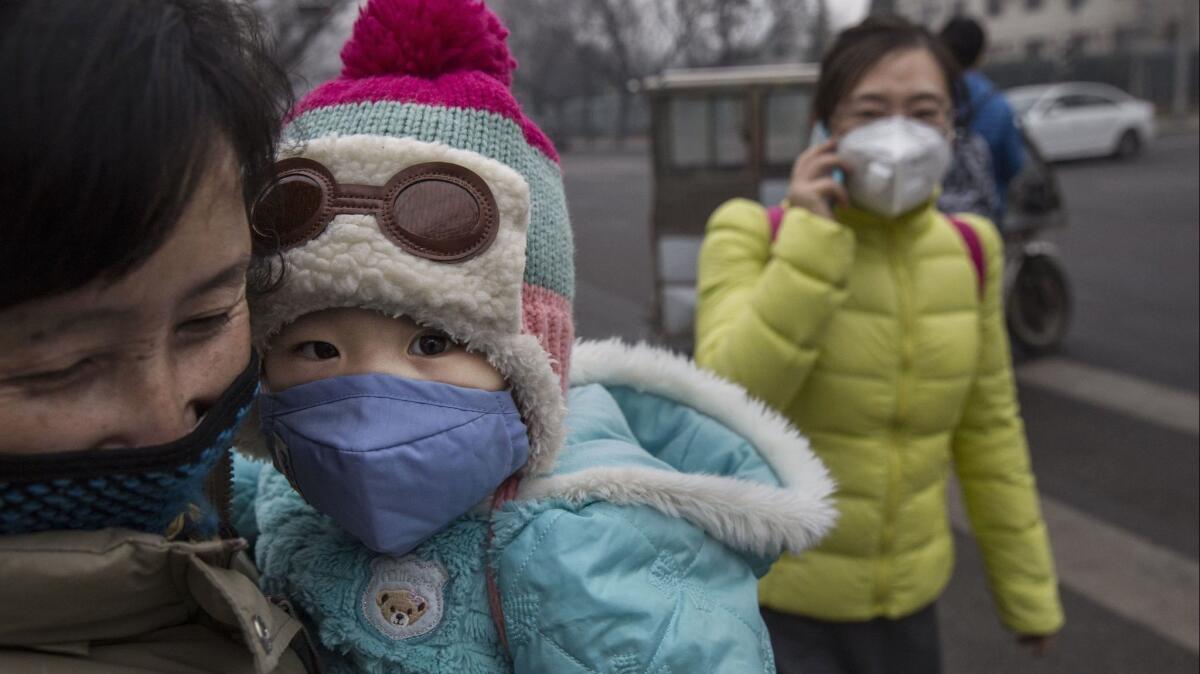Climate change is making us sicker and shortening our lives, doctors say

- Share via
In the welter of daily demands upon physicians, it might be easy to imagine that weaning the world off its reliance on fossil fuels is asking a bit too much.
But preventing sickness and averting premature death are squarely in a physician’s wheelhouse. And dramatic increases in both sickness and death are projected for the foreseeable future as the world’s continued reliance on fossil fuels results in more air pollution, infectious diseases, malnutrition, wildfires, extreme heat and increasingly powerful weather events.
So combating climate change is clearly part of a doctor’s job description, argue a pair of articles published in last week’s edition of the New England Journal of Medicine. If there’s a failure to act, well over 250,000 people around the world will lose their lives each year between 2030 and 2050, according to estimates from the World Health Organization.
“Working to rapidly curtail greenhouse gas emissions is now essential to our healing mission,” wrote Dr. Caren G. Solomon of Brigham and Women’s Hospital in Boston and Dr. Regina C. LaRocque of Massachusetts General Hospital, both physicians and public health experts.
Doctors should use their trust and authority to educate colleagues, patients and students about the health consequences of climate change and the need for rapid reductions in fossil fuel use, Solomon and LaRocque wrote. “We can help motivate people to act by clarifying the links between environmental degradation and tangible problems.”
Conveniently, the widely circulated medical journal also published a review of current findings to help doctors get up to speed. In a comprehensive accounting, epidemiologist Andrew Haines and global health specialist Kristie Ebi reprised roughly 20 years’ worth of research on the effects that a warming environment can be expected to have on heat-related illnesses, diseases linked to poor air quality, food production, and scourges spread by such insects as ticks and mosquitoes.
None of that takes into account the fact that the U.S. healthcare sector’s energy use is itself a major driver of global warming. One estimate blames hospitals, doctors’ offices, biomedical labs and pharmaceutical manufacturing for nearly one-tenth of the nation’s carbon dioxide emissions; if the U.S. healthcare sector were a country, it would rank seventh in the world, according to that calculation.
The array of health-related ills that flows from a reliance on fossil fuels is sprawling:
Nutrition: As the climate heats up and agricultural conditions shift, yields of vegetable and legume crops will suffer. In addition, rising concentrations of carbon dioxide will adversely affect the nutritional quality of such cereal crops as rice and wheat, lowering their levels of protein and B vitamins. A 2016 estimate published in the Lancet reckons that by 2050, unchecked climate change will reduce food availability to the average person by 3.2% and will have led to the premature deaths of 529,000 adults worldwide compared with a world without global warming.
Infectious and microbial disease: Disease-spreading microbes and insects will proliferate as some of the planet’s hottest, wettest and poorest places grow hotter, wetter and poorer. Sea-level rise and coastal flooding will do more than drown people and crops: they will also accelerate the spread of cholera, malaria, diarrheal disease, dengue fever, encephalitis and Zika virus. Bodies of water will be plagued by more and deadlier algal blooms (as seen in Florida last year) and tainted more often by cryptosporidiosis, cholera and leptospirosis, sickening more people.
Chronic conditions: Unchecked air pollution and rising heat will cause and exacerbate asthma, allergies and cardiovascular disease. Worldwide, pollutants in the air are reckoned to be responsible for between 6.5 million and 10 million premature deaths annually. In the United States, it is estimated that approximately 58% of the excess deaths are attributable to the use of fossil fuel and arise particularly from traffic, power production and industry.
Heat exposure: The sheer weight of exposure to excessive heat will be deadly across the American South, Africa and East Asia. One modeling study that plumbed data from 451 locations in 23 countries showed that deaths from heat stroke are already occurring, and by the end of this century could rise by between 3% and 12% in hotter regions. Rising heat led to the loss of 153 billion hours of labor in 2017, 80% of it in the agricultural sector.
And this list does not take into account the injuries and deaths caused by hurricanes, mudslides, wildfires and extreme weather events — all of which are expected to increase as heat-trapping gases continue to build up in the Earth’s atmosphere.
The World Bank has estimated that unless governments and societies prepare to absorb climate shocks, global warming could force more than 100 million people into extreme poverty by 2030. That kind of deprivation carries serious implications for health as well.
The accounting in the New England Journal of Medicine was released on the same day that the Trump administration’s nominee to head the Environmental Protection Agency promised to keep unwinding Obama-era regulations aimed at addressing climate change.
Asked whether he believed scientists’ warnings about the consequences of human-generated climate change, Andrew Wheeler told a Senate panel that he considered climate change “a huge issue that has to be addressed globally.” But, the former coal lobbyist said, “I would not call it the biggest crisis.”
In their essay, Solomon and LaRocque acknowledge that the sprawling studies, the dire numbers and the sheer magnitude of the world’s current reliance on greenhouse-gas-emitting substances are both frightening and overwhelming. But they have overcome despair and paralysis to work with medical students on climate action, encourage organizations (including the American Medical Assn.) to divest themselves of investments in fossil-fuel companies and educate lawmakers about why climate change is a public health issue.
“Our actions matter,” the doctors wrote. “When the next generation asks us, ‘What did you do about climate change?’ we want to have a good answer.”
MORE IN SCIENCE







